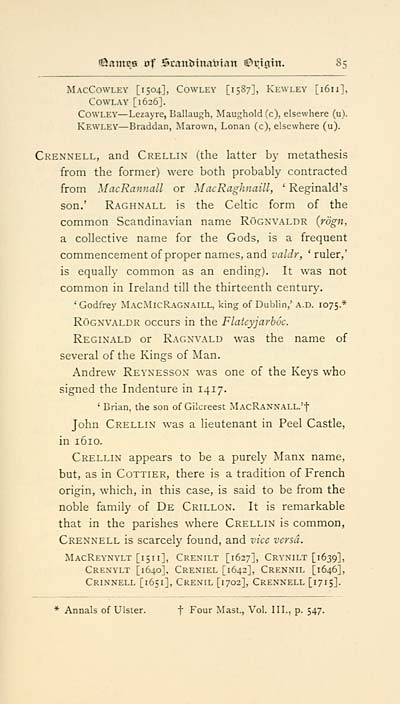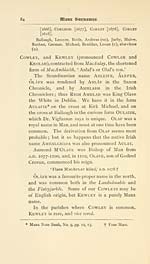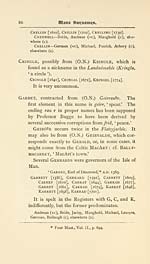Download files
Complete book:
Individual page:
Thumbnail gallery: Grid view | List view

aaam^a tif ScanbinatJian 0vx$xn. 85
MacCowley [1504], Cowley [1587], Kewley [161 1],
COWLAY [1626].
Cowley— Lezay re, Ballaugh, Maughold (c), elsewhere (u).
Kewley — Braddan, Marown, Lonan (c), elsewhere (u).
Crennell, and Crellin (the latter by metathesis
from the former) were both probably contracted
from MacRannall or MacRaghnaill, ' Reginald's
son.' Raghnall is the Celtic form of the
common Scandinavian name ROgnvaldr (rogn,
a collective name for the Gods, is a frequent
commencement of proper names, and valdr, 'ruler,'
is equally common as an ending). It was not
common in Ireland till the thirteenth century.
'Godfrey MacMicRagnaill, king of Dublin,' a.d. 1075.*
ROGNVALDR occurs in the Flateyjarboc.
Reginald or Ragxvald was the name of
several of the Kings of Man.
Andrew Reynessox was one of the Keys who
signed the Indenture in 1417.
' Brian, the son of Gilcreest MACRANNALL.'f
John Crellin was a lieutenant in Peel Castle,
in 1610.
Crellin appears to be a purely Manx name,
but, as in Cottier, there is a tradition of French
origin, which, in this case, is said to be from the
noble family of De Crillon. It is remarkable
that in the parishes where Crellin is common,
Crennell is scarcely found, and vice versa.
MacReynylt [1511], Crenilt [1627], Crynilt [1639],
Crenylt [1640], Creniel [1642], Crenxil [1646],
Crlxnell [1651], Crenil [1702], Crennell [1715].
* Annals of Ulster. f Four Mast., Vol. III., p. 547.
MacCowley [1504], Cowley [1587], Kewley [161 1],
COWLAY [1626].
Cowley— Lezay re, Ballaugh, Maughold (c), elsewhere (u).
Kewley — Braddan, Marown, Lonan (c), elsewhere (u).
Crennell, and Crellin (the latter by metathesis
from the former) were both probably contracted
from MacRannall or MacRaghnaill, ' Reginald's
son.' Raghnall is the Celtic form of the
common Scandinavian name ROgnvaldr (rogn,
a collective name for the Gods, is a frequent
commencement of proper names, and valdr, 'ruler,'
is equally common as an ending). It was not
common in Ireland till the thirteenth century.
'Godfrey MacMicRagnaill, king of Dublin,' a.d. 1075.*
ROGNVALDR occurs in the Flateyjarboc.
Reginald or Ragxvald was the name of
several of the Kings of Man.
Andrew Reynessox was one of the Keys who
signed the Indenture in 1417.
' Brian, the son of Gilcreest MACRANNALL.'f
John Crellin was a lieutenant in Peel Castle,
in 1610.
Crellin appears to be a purely Manx name,
but, as in Cottier, there is a tradition of French
origin, which, in this case, is said to be from the
noble family of De Crillon. It is remarkable
that in the parishes where Crellin is common,
Crennell is scarcely found, and vice versa.
MacReynylt [1511], Crenilt [1627], Crynilt [1639],
Crenylt [1640], Creniel [1642], Crenxil [1646],
Crlxnell [1651], Crenil [1702], Crennell [1715].
* Annals of Ulster. f Four Mast., Vol. III., p. 547.
Set display mode to: Large image | Transcription
Images and transcriptions on this page, including medium image downloads, may be used under the Creative Commons Attribution 4.0 International Licence unless otherwise stated. ![]()
| Early Gaelic Book Collections > Blair Collection > Surnames & place-names of the Isle of Man > (103) |
|---|
| Permanent URL | https://digital.nls.uk/82100884 |
|---|
| Description | A selection of books from a collection of more than 500 titles, mostly on religious and literary topics. Also includes some material dealing with other Celtic languages and societies. Collection created towards the end of the 19th century by Lady Evelyn Stewart Murray. |
|---|
| Description | Selected items from five 'Special and Named Printed Collections'. Includes books in Gaelic and other Celtic languages, works about the Gaels, their languages, literature, culture and history. |
|---|

